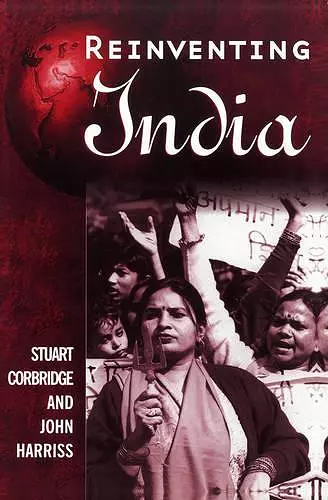Reinventing India
Liberalization, Hindu Nationalism and Popular Democracy
Stuart Corbridge author John Harriss author
Format:Paperback
Publisher:John Wiley and Sons Ltd
Currently unavailable, and unfortunately no date known when it will be back
This paperback is available in another edition too:
- Hardback£60.00(9780745620763)

When India was invented as a "modern" country in the years after Independence in 1947 it styled itself as a secular, federal, democratic Republic committed to an ideology of development. Nehru's India never quite fulfilled this promise, but more recently his vision of India has been challenged by two "revolts of the elites": those of economic liberalization and Hindu nationalism. These revolts have been challenged, in turn, by various movements, including those of India's "Backward Classes". These movements have exploited the democratic spaces of India both to challenge for power and to contest prevailing accounts of politics, the state and modernity.
Reinventing India offers an analytical account of the history of modern India and of its contemporary reinvention. Part One traces India's transformation under colonial rule, and the ideas and social forces which underlay the deliberations of the Constituent Assembly in 1946 to consider the shaping of the post-colonial state. Part Two then narrates the story of the making and unmaking of this modern India in the period from 1950 to the present day. It pays attention to both economic and political developments, and engages with the interpretations of India's recent history through key writers such as Francine Frankel, Sudipta Kaviraj and Partha Chatterjee. Part Three consists of chapters on the dialectics of economic reform, religion, the politics of Hindu nationalism, and on popular democracy. These chapters articulate a distinct position on the state and society in India at the end of the century, and they allow the authors to engage with the key debates which concern public intellectuals in contemporary India.
Reinventing India is a lucid and eminently readable account of the transformations which are shaking India more than fifty years after Independence. It will be welcomed by all students of South Asia, and will be of interest to students of comparative politics and development studies.
"This is a major contribution on the political sociology of contemporary India. It is a detailed and incisive account of the changing state-society relationships in the context of elite movements (economic liberalization and Hindu nationalism) on the one hand and the popular mobilizations of the long-suppressed subordinate classes and castes on the other." Pranab Bardhan, University of California at Berkeley
"This is a superb analysis of India's changing political economy from the 1940s to 2000. The authors sustain a clear and compelling argument while negotiating a thicket of contentious issues related to politics and the state at different levels, democracy, class structures, modes of accumulation, development, ideologies and religions. Essential reading for all scholars who have an interest in these subjects." David Potter, The Open University
'This is a useful book. The authors should be congratulated for providing a comprehensive treatment of a complex and fast changing political economy. The book can be used with profit for upper division courses dealing with post-independence India.' Contemporary Sociology
"This is a Superb book, deserving readers from several fields." Canadian Journal of Sociology Online
"Those who are seriously interested in acquiring an understanding of contemporary India are recommended to tackle this scholarly text." Progress in Human Geography
"Interesting to the student of contemporary democracies, and i found reading them in conjunction very illuminating. When there is such an excellent body of English Language Literature on contemporary India society one wonders why it is that so many sociology students in the west will complete their studies without ever having read an article or picked up a book written on the 'world's largest democracy'." Journal of the British Sociological Association
ISBN: 9780745620770
Dimensions: 231mm x 152mm x 27mm
Weight: 526g
336 pages